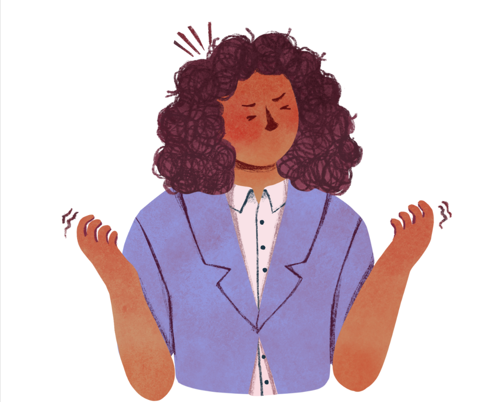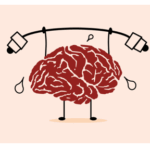Obsessive-Compulsive Disorder (OCD)
Obsessive-Compulsive Disorder (OCD) is much more than an obsession of cleaning or fixing things in a certain order. Millions of individuals all over the world are suffering from OCD which is a serious mental health illness. Obsessive-Compulsive Disorder (OCD) is Obsession of unwanted thoughts or fears that reoccur and Compulsion of repeated behaviours to minimise the anxiety which was occurred by these obsessions. Obsessive-Compulsive Disorder (OCD) can be understood as explaining the obsession and compulsion for example a person who has fear of germs is the obsession and to deal with that obsession he washes his hands dozens of times daily which results as a compulsion. Although for a moment it relieved the anxiety, that fear or obsession can come back again and again which becomes an uncomfortable cycle.
Obsessive-Compulsive Disorder’s (OCD) healing is possible with the right education and treatment but living with it is very exhausting and stressful.
Causes of Obsessive-Compulsive Disorder (OCD)
Obsessive-Compulsive Disorder (OCD) does not have a single cause, but has a combination of biological psychological or environmental factors:
- Anxiety
- Genetics which relates to family members and also their successive generations.
- trauma and stress could also lead to ocd like living stressful life situations or illness could trigger Obsessive-Compulsive Disorder (OCD)
- personality traits like perfectionism can also play a part
It is not anyone’s fault as people do try to cope up with it and have a balanced life.
Symptoms of Obsessive-Compulsive Disorder (OCD)
The obsessive symptoms could be unwanted thoughts, unpleasant ideas or images that reoccur. One can get afraid of germs, getting dirty or contaminations, getting fear of injury to oneself or others, persistent thoughts of violence, obsession of perfectionism like needing things to be perfect or symmetrical or in a certain way, fear of losing something important, recurring thoughts of locking the doors or switches being turned off or not.
The Compulsion symptoms could be repetitive behaviours like excessive washing or hand washing, checking door locks or appliances over and over again, repeating, tapping or counting words, following a specific order for putting objects, always trying to get reassurance from others, keeping the phrase ready “just in case”.
Types of Obsessive-Compulsive Disorder (OCD)
- Contamination Obsessive-Compulsive Disorder (OCD) :-
Contamination Obsessive-Compulsive Disorder (OCD) is a fear of illness, dirt or germs which leads to obsession of hyper cleaning or not going out. It is a consistent fear of contamination and repeated need of cleaning hands or objects. It may include fear of being exposed to viruses and bacteria which creates a compulsion to wash your hands every few minutes as it may develop an effort to relieve this anxiety. One could feel discarding all the items from which they can get contaminated or engaging in constant cleaning rituals.
- Checking Obsessive-Compulsive Disorder (OCD) :-
Checking Obsessive-Compulsive Disorder (OCD) is a fear of accidents, theft, fire etc, that is checking appliances, switches or locks repeatedly. These behaviours can be compulsive, constant and extreme which becomes an exhausting cycle which could be very hard to break. These thoughts create intense fear and doubt for a possibility of causing harm or being responsible for any bad happening or making a mistake. There are no obvious reasons why this is happening to a person but one might need to check their past actions and try to get the answers to how it all got started. When a person is Checking Obsessive-Compulsive Disorder (OCD), he is in constant worry until and unless he double checks the thing which is making him worried, once he double checks whatever constantly was coming to his mind it would give him a temporary sense of relief from that anxiety.
- Symmetry and Order Obsessive-Compulsive Disorder (OCD) :-
Symmetry and Order Obsessive-Compulsive Disorder (OCD) is an obsession of things required to be aligned, balanced or just in the right place. One can feel anxious or extreme distress if things are not in a certain order. This obsession can drain a person, give stress and interfere with their daily functioning. If a person encounters an object that isn’t properly aligned or which appears imperfect in any way then that person would feel intense anxiety. Sometimes this obsession irritates other people who live with them, as things not a certain in order or not in symmetry or not very neat could not bother them but it bothers people with ocd so they try to keep things in a certain way and this could make tiff between them.
- Harm Obsessive-Compulsive Disorder (OCD) :-
Harm Obsessive-Compulsive Disorder (OCD) is a fear of harming self or other people. People with Harm Obsessive-Compulsive Disorder (OCD) feel that after hurting someone one might be worried that they secretly enjoyed and may compulsively review the memory, they worry that they could have harmed someone and forget about it, they get unwanted thoughts about harming themselves for others as they also imagine all the scenarios.
Sharp objects, driving or anything that could be harmful for people who are suffering from Obsessive-Compulsive Disorder (OCD).
- Intrusive Thoughts Obsessive-Compulsive Disorder (OCD) :-
Intrusive Thoughts Obsessive-Compulsive Disorder (OCD) is a disorder where one gets intrusive thoughts of violence, sexual or religious nature. These thoughts are uncontrollable and reoccuring which engages in a repeated behaviour of compulsion. One can get aggressive thoughts of violently hurting someone, jumping in front of a train or moving car, pushing someone or attacking someone who is closed to you, having sexual thoughts which also involves imagining family members or other people, getting a fear of being attracted to a family member and having sexual thoughts about them, having religious or moral thoughts like being against any personal religious belief all, one might have committed a sin or has become an immoral person.
- Hoarding Obsessive-Compulsive Disorder (OCD) :-
Hoarding Obsessive-Compulsive Disorder (OCD) is a fear of not being able to throw away items which are not needed anymore. A person feels if they throw away that object anything bad will happen to them. There is an excessive accumulation of clutter of unwanted things. A person would always find it difficult to discard anything and this creates emotional distress.
Conclusion
Obsessive-Compulsive Disorder is a very difficult disorder to live with and is often misinterpreted. But with correct treatment and support of loved ones it is treatable with medication, counselling, therapy and lifestyle changes. So if you know someone suffering from OCD do not get frustrated with them try to adapt their form of living and help them get a balance in their life slowly leading to a recovery journey.



